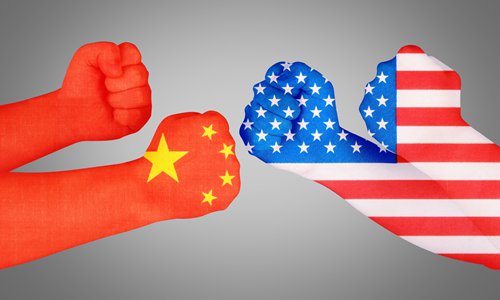HOME >> OPINION
US hegemonic dream is a nightmare reality that cannot be ignored
By Zhang Tengjun Source:Global Times Published: 2019/8/7 20:52:36

Photo: IC
Recently, over 100 US experts signed an open letter addressed to US President Donald Trump and members of Congress titled "China is not an enemy."
Soon afterward, a separate group of US experts consisting of retired military and intelligence officials signed an open letter to Trump, urging him to continue applying pressure on China. They also encouraged economic decoupling between the two countries. That could be the most striking debate on whether China-US relations are reaching a tipping point since 2013.
Michael Pillsbury, Trump's adviser and director for China strategy at the Washington-based think tank Hudson Institute, participated as a speaker at the Atlantic Council's Asia Security Initiative on July 25, noting that he is opposed to the "China is not an enemy" letter. He also promoted the plot that China aims to replace the US as the global superpower.
Pillsbury, who studied history under leading US political scientist and China watcher Michel Oksenberg, had once advocated establishing military ties with China. He has been studying China's foreign and security policies for a long time.
However, Pillsbury sided with the hawks, who are in their 30s and 40s and have not experienced early China-US interactions. The group also knows very little about Chinese traditional culture. Pillsbury should have evaluated China-US ties from a broader and more rational perspective.
Pillsbury created a conspiracy theory that China has been trying to replace the US as the global superpower since the founding of the People's Republic of China in 1949. Ironically, the main evidence given to support this idea is that some of China's leaders are fond of reading a book Zizhi Tongjian, which means comprehensive mirror in aide of governance.
Pillsbury also said that Trump does not see China as an enemy because "not once has any Trump administration official used the word 'enemy.'" Such wordplay cannot convince the audiences as he has obviously ignored US Secretary of State Mike Pompeo's threats to other countries that they should not cooperate with China. He also forgot about Kiron Skinner, US State Department's policy planning director who described the US rivalry with China as "a fight with a really different civilization."
And of course, he ignored the warning from FBI Director Chris Wray that students from China are engaged in espionage. The Trump administration may not use the word "enemy" daily when discussing China, but if actions are to reveal anything, it is clear that China is being treated like an enemy.
US hawks are opportunists. Disappointingly, their ignorant viewpoints are selling well in Washington and have had a significant impact on Washington's China policy.
Both the anti-China letter and Pillsbury's remarks are signals indicating a tougher US policy toward China. The restrained advisory letter, however, can hardly reverse the tide.
There is no essential difference between hard-liners and moderates when it comes to China-US relations. Their divergence lies only in which measures should be taken to contain China. Rational and objective discussions are no longer welcomed. As this game continues, such divergence will become even less important.
Those concerned with China-US relations might remember the time when former US president Barack Obama said, "The US welcomes the rise of a China that is peaceful, stable, prosperous, and a responsible player in global affairs."
The circumstances have since changed. China is ready to make more significant contributions to the world, but unfortunately Obama's words have slipped from US memory.
China-US relations are suffering hardships not only because of their differences as both sides have sharply contradicted one other at different times.
China and the US were Cold War enemies and were impacted by former Taiwan regional leader Lee Teng-hui's visit to the US in 1995, and the bombing of the Chinese Embassy in Belgrade in 1999. However, those events and other conflicts caused a regression in bilateral relations. China-US ties can advance in twists and turns, reflecting the resilience and foundation of the bilateral relationship.
However, because of the changing mind-sets of both sides, things are different. US attitude toward China has changed. Washington is becoming paranoid and suspicious. It seems many US hawks still live in the 19th century and have refused to wake up from their hegemonic dream.
Peace is out of the question as long as the hegemonic power treats the rising power as a threat. A new cold war will become a self-fulfilling prophecy if the US continues to contain China.
Those in the US should be aware that nobody could withstand the breakdown of the bilateral relationship. They need to view China's rise rationally and objectively and handle China-US relations calmly.
The author is an assistant research fellow at the China Institute of International Studies. opinion@globaltimes.com.cn
Newspaper headline: US hegemonic plan is a nightmare
Posted in: VIEWPOINT